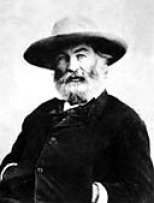Strategy
the management of language for a specific effect. The strategy or rhetorical strategy of a poem is the planned placing of elements to achieve an effect. The rhetorical strategy of most love poems is deployed to convince the loved one to return to the speaker’s love. By appealing to the loved one’s sympathy, or by flattery, or by threat, the lover attempts to persuade the loved one to love in return.
Had I The Choice
Walt Whitman
Had I the choice to tally greatest bards,
To limn their portraits, stately, beautiful, and emulate at will,
Homer with all his wars and warriors—Hector, Achilles, Ajax,
Or Shakespeare’s woe-entangled Hamlet, Lear, Othello—Tennyson’s fair ladies,
Meter or wit the best, or choice conceit to wield in perfect rhyme, delight of singers;
These, these, O sea, all these I’d gladly barter,
Would you the undulation of one wave, its trick to me transfer,
Or breathe one breath of yours upon my verse,
And leave its odor there.
A strategy is very apparent in Walt Whitman’s “Had I the Choice”. He strategically names off the historical figures Homer, Shakespeare, and Tennyson to create the effect of opposite statements. Homer is known for writing about wars and warriors, Shakespeare is known for writing about love-entangled characters, and Tennyson is known for writing about “fair ladies”. “Meter or wit the best, or choice conceit to wield in perfect rhyme, delight of singers”. None of them write better than the others because they’re all so different.
"Do I contradict myself? Very well, then I contradict myself, I am large, I contain multitudes." ~Walt Whitman
Walt Whitman

Poet and writer, born in West Hills, Huntington, Long Island, New York, USA. He was educated in Brooklyn (1825–30) where his father, a carpenter and farmer, had settled c.1823. He left school at around age 12 and worked as an office boy, and when aged 13 became a printer's assistant on several papers in New York City. While exposing himself to opera and theatre, he began to contribute occasional pieces to newspapers (including some of the earliest reports of baseball games), and taught in various schools on Long Island (1836–41). In 1838 he was the founder and editor of a Huntington, Long Island, newspaper, The Long Islander. He continued educating himself through his reading, contributed both fiction and commentary to various magazines (1841–8), and worked as an editor on several newspapers in and around New York City, notably the Brooklyn Eagle (1846–8). He was dismissed from this last post because of his outspoken anti-slavery views. He then journeyed to New Orleans where for three months he wrote for the New Orleans Crescent. On returning to Brooklyn, he continued writing for and editing various newspapers (1848–62), and occasionally helped his father build houses.
Meanwhile, c.1848 he had begun writing poetry in earnest. In 1855 he gathered 12 of these relatively long poems and self-published them as Leaves of Grass. His radically free-flowing style and intensely personal subject-matter did not engage the public or critics, although when Ralph Waldo Emerson wrote, ‘I greet you at the beginning of a new career’, Whitman stamped that on the cover of an enlarged second edition (1856). In 1862 he went to Virginia to find his brother, who had been wounded in a battle, and stayed in Washington, DC to serve as a nurse in hospitals with wounded Civil War soldiers. He obtained a job as clerk in the Department of the Interior (1865), but was soon dismissed when it was discovered he was the author of Leaves of Grass, already regarded as scandalous because of its frank sexual allusions. (His second volume of poems, Drum Taps, 1865, was more acceptable to the public.) He then found a job in the attorney general's office (1865–73), but when he suffered a paralytic stroke he moved to Camden, NJ.
He continued to write and publish larger editions of Leaves of Grass (his deathbed edition appearing in 1892) and also published the second of his prose works, Specimen Days (1882), the first being Democratic Vistas (1877). Revered by a small band as the Good Gray Poet, he held court in Camden, his reputation actually higher in Europe. It was only in the decades after his death that Whitman came to be recognized as one of the major American creative forces.
(http://www.biography.com/search/article.do?id=9530126)
